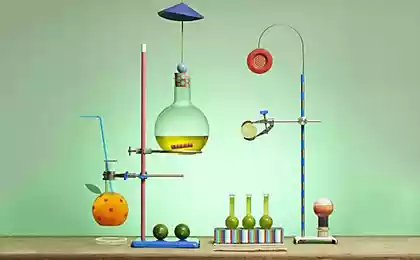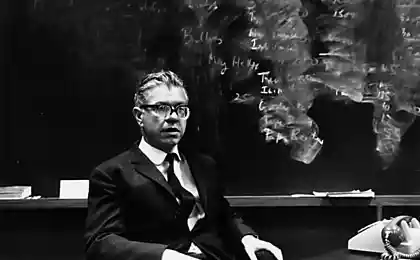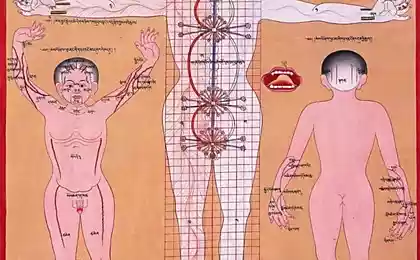490
10 scientific terms that we use incorrectly
Sixteen million seventy six thousand one hundred forty three
© Hyunjin Jenny Kim
Scientific ideas and terms are gradually leaving the laboratories and are increasingly becoming part of everyday life and language. However, often we use them incorrectly, forcing scientists to blush. Scientific popularnatural io9 made the top 10 scientific terms that are often distorted. Proof "of the term "proof" has a specific definition (based on logic to demonstrate that some of the conclusions stem from certain premises), which do not correspond to the sense in which it is used in ordinary conversation ("the indisputable evidence of anything"). There is a great discrepancy between what scientists say and what people hear: scientists tend to give a clear definition. And from this it follows that science never proves nothing! So when we ask the question, "what do you have proof that we evolved from other species?" or "Can you really prove that climate change is a consequence of human activity?", we'd rather polychim in response than say: "of Course we can!" The fact is that science is nothing for hundred percent does not prove, but simply produces a more plausible and complete theory of how the world works, which constantly require improvements and corrections. And this is one reason why science is so successful," explains physicist Sean Carroll.
Theory "When people in the wider community hear the word "theory", they interpretiruya it as "idea" or "assumption". We have something more interesting, says astrophysicist Dave Goldberg. — A scientific theory is the whole system of tested ideas, which you can then refute or at the level of theory or in the experiment. The best theories (relativity, quantum laws or evolution) have withstood hundreds of years and many trials on the part of those who wanted to prove that he's smarter than Einstein, and those who just doesn't like to start my life all this metaphysics. Finally, the theory of the plastic, but not infinitely. Theories to be incomplete or false in any prerequisites, but it will not destroy them until the end. The theory of evolution, for example, over the years have changed quite a bit, but not so much that its main idea today it was impossible to recognize. The problem with the phrase "just a theory" in that it contains the assumption that a scientific theory is a small thing, but it isn't."
Quantum uncertainty is Even sadder, according to Goldberg, in the case where the physical concepts used for spiritual purposes: "At the heart of quantum mechanics lies the dimension. When the observer records the time, position or energy of the system, it causes collapse of the wave function. But the fact that in this sense the universe is not deterministic doesn't mean that you are in control. It is worrying that in some quarters, quantum uncertainty is increasingly associated with ideas of the soul, the subjective Universe, or some other pseudoscience. In the end, we really made of quantum particles (protons, neutrons, electrons) and are part of the quantum Universe. This is certainly cool — but only in the sense in which steep and all of physics".
Acquired and congenital "One of my "favorite" (in the sense of a misunderstanding) the fact is the issue of congenital or acquired human qualities or other opposition from the category "nature" — "nurture", says evolutionary biologist Marlene ZUK. The first question I usually ask when it comes to behavior, is "it's All in the genes? Not?". Which, of course, says about the misunderstanding, because ALL the signs is always the result of genes and environment. The only difference between the terms rather than the characteristics themselves, can be genetic or acquired — as if the twins were placed in different environment and they did something different (say different languages), that is the influence of the environment. And the fact that people speak French or Italian or something like that, can't depend on the environment, because obviously everyone in the beginning, at the genetic level, there must be the ability for foreign languages".
Natural "the word "natural" there are so many values that they no longer possible to distinguish between — explains synthetic biologist Terry Johnson. — The most basic of them highlights phenomena that exist only because of humanity, thus separating in some way the nature of man. That is, our products are not natural, and the products of, say, bees or beavers — completely. When applied to food the word "natural" becomes quite unintelligible. In Canada, corn is sold under the label "natural" if during her growing without treatment with special substances. But corn itself is the fruit of thousands of years of breeding, a plant that would not exist in its present form, not be the man."
Gene Johnson is Even more concerned about the use of the word "gene": "25 scholars have argued for two days before reaching a modern definition of a gene: is a discrete bit of DNA that you can specify with the words "something it produces or regulates the production". This wording leaves space for maneuver, but in everyday language the problems start when the word "gene" is the phrase "responsible for". For example, we all have the genes for hemoglobin, but not all of us suffer from sickle-cell anemia — it is caused by only certain versions of this gene, called alleles.
However, when we say "responsible for" means something like "this gene causes heart disease", while in reality everything looks different: "people with this allele of the gene seem to have higher rates of heart disease, but we don't know why, and maybe it kompensiruet some advantages, which also gives the same allele and that we were not looking".
Statistically significant Mathematician Jordan Ellenberg wants to set the record straight on this idea: "This is one of those terms that scientists would like to rename. Because the test for statistical significance doesn't measure the importance or size of a particular effect, it only determines whether you can isolate it by using our statistical tools. Therefore, it would be better to use "statistically noticeable" or "statistically distinguishable".
Natural selection is Paleoecology Jacklin Gill says that people often don't understand the basic concepts of evolutionary theory: "My list is headed by "survival of the fittest". First, it's not quite the original words of Darwin and, secondly, people misunderstand what "the fittest". Evolution is often mistakenly appears to be directed or even meaningful for some organisms (but sexual selection has not been canceled! and that means that random mutation)".
Natural selection involves the survival of the fittest or the smartest. Just remain organisms that are better adapted to the environment, and that could mean anything from "smallest" or "most poisonous" to "best cope for weeks without water." In addition, creatures don't always evolve in a manner that we can call adaptation. Often the evolutionary path of the animal is random mutations and new characteristics that you find attractive other individuals of his species.
Geological time scale is "I often confronted with the fact that people lack understanding geological time scales. Everything prehistoric is compressed in their minds, and people think that 20 thousand years ago we had completely different flora-fauna (no), or even dinosaurs (three times no). Tubes with small plastic figurines of dinosaurs, which are often found among the mammoths, and cavemen, then, of course, only in the way". adds Gill.
Organic Entomologist Gwen Pearson says that there is a whole constellation of terms that are traveling together with the word "organic": "natural", "without chemicals": "Technically all food is organic because it contains carbon. But some products can be natural, organic and at the same time very dangerous. While others are synthetic, artificially produced, on the contrary, safe. For example, insulin — it is produced genetically modified bacteria, and it saves lives."published
P. S. And remember, only by changing their consumption — together we change the world! ©
Source: theoryandpractice.ru/posts/9194-mixed-up
© Hyunjin Jenny Kim
Scientific ideas and terms are gradually leaving the laboratories and are increasingly becoming part of everyday life and language. However, often we use them incorrectly, forcing scientists to blush. Scientific popularnatural io9 made the top 10 scientific terms that are often distorted. Proof "of the term "proof" has a specific definition (based on logic to demonstrate that some of the conclusions stem from certain premises), which do not correspond to the sense in which it is used in ordinary conversation ("the indisputable evidence of anything"). There is a great discrepancy between what scientists say and what people hear: scientists tend to give a clear definition. And from this it follows that science never proves nothing! So when we ask the question, "what do you have proof that we evolved from other species?" or "Can you really prove that climate change is a consequence of human activity?", we'd rather polychim in response than say: "of Course we can!" The fact is that science is nothing for hundred percent does not prove, but simply produces a more plausible and complete theory of how the world works, which constantly require improvements and corrections. And this is one reason why science is so successful," explains physicist Sean Carroll.
Theory "When people in the wider community hear the word "theory", they interpretiruya it as "idea" or "assumption". We have something more interesting, says astrophysicist Dave Goldberg. — A scientific theory is the whole system of tested ideas, which you can then refute or at the level of theory or in the experiment. The best theories (relativity, quantum laws or evolution) have withstood hundreds of years and many trials on the part of those who wanted to prove that he's smarter than Einstein, and those who just doesn't like to start my life all this metaphysics. Finally, the theory of the plastic, but not infinitely. Theories to be incomplete or false in any prerequisites, but it will not destroy them until the end. The theory of evolution, for example, over the years have changed quite a bit, but not so much that its main idea today it was impossible to recognize. The problem with the phrase "just a theory" in that it contains the assumption that a scientific theory is a small thing, but it isn't."
Quantum uncertainty is Even sadder, according to Goldberg, in the case where the physical concepts used for spiritual purposes: "At the heart of quantum mechanics lies the dimension. When the observer records the time, position or energy of the system, it causes collapse of the wave function. But the fact that in this sense the universe is not deterministic doesn't mean that you are in control. It is worrying that in some quarters, quantum uncertainty is increasingly associated with ideas of the soul, the subjective Universe, or some other pseudoscience. In the end, we really made of quantum particles (protons, neutrons, electrons) and are part of the quantum Universe. This is certainly cool — but only in the sense in which steep and all of physics".
Acquired and congenital "One of my "favorite" (in the sense of a misunderstanding) the fact is the issue of congenital or acquired human qualities or other opposition from the category "nature" — "nurture", says evolutionary biologist Marlene ZUK. The first question I usually ask when it comes to behavior, is "it's All in the genes? Not?". Which, of course, says about the misunderstanding, because ALL the signs is always the result of genes and environment. The only difference between the terms rather than the characteristics themselves, can be genetic or acquired — as if the twins were placed in different environment and they did something different (say different languages), that is the influence of the environment. And the fact that people speak French or Italian or something like that, can't depend on the environment, because obviously everyone in the beginning, at the genetic level, there must be the ability for foreign languages".
Natural "the word "natural" there are so many values that they no longer possible to distinguish between — explains synthetic biologist Terry Johnson. — The most basic of them highlights phenomena that exist only because of humanity, thus separating in some way the nature of man. That is, our products are not natural, and the products of, say, bees or beavers — completely. When applied to food the word "natural" becomes quite unintelligible. In Canada, corn is sold under the label "natural" if during her growing without treatment with special substances. But corn itself is the fruit of thousands of years of breeding, a plant that would not exist in its present form, not be the man."
Gene Johnson is Even more concerned about the use of the word "gene": "25 scholars have argued for two days before reaching a modern definition of a gene: is a discrete bit of DNA that you can specify with the words "something it produces or regulates the production". This wording leaves space for maneuver, but in everyday language the problems start when the word "gene" is the phrase "responsible for". For example, we all have the genes for hemoglobin, but not all of us suffer from sickle-cell anemia — it is caused by only certain versions of this gene, called alleles.
However, when we say "responsible for" means something like "this gene causes heart disease", while in reality everything looks different: "people with this allele of the gene seem to have higher rates of heart disease, but we don't know why, and maybe it kompensiruet some advantages, which also gives the same allele and that we were not looking".
Statistically significant Mathematician Jordan Ellenberg wants to set the record straight on this idea: "This is one of those terms that scientists would like to rename. Because the test for statistical significance doesn't measure the importance or size of a particular effect, it only determines whether you can isolate it by using our statistical tools. Therefore, it would be better to use "statistically noticeable" or "statistically distinguishable".
Natural selection is Paleoecology Jacklin Gill says that people often don't understand the basic concepts of evolutionary theory: "My list is headed by "survival of the fittest". First, it's not quite the original words of Darwin and, secondly, people misunderstand what "the fittest". Evolution is often mistakenly appears to be directed or even meaningful for some organisms (but sexual selection has not been canceled! and that means that random mutation)".
Natural selection involves the survival of the fittest or the smartest. Just remain organisms that are better adapted to the environment, and that could mean anything from "smallest" or "most poisonous" to "best cope for weeks without water." In addition, creatures don't always evolve in a manner that we can call adaptation. Often the evolutionary path of the animal is random mutations and new characteristics that you find attractive other individuals of his species.
Geological time scale is "I often confronted with the fact that people lack understanding geological time scales. Everything prehistoric is compressed in their minds, and people think that 20 thousand years ago we had completely different flora-fauna (no), or even dinosaurs (three times no). Tubes with small plastic figurines of dinosaurs, which are often found among the mammoths, and cavemen, then, of course, only in the way". adds Gill.
Organic Entomologist Gwen Pearson says that there is a whole constellation of terms that are traveling together with the word "organic": "natural", "without chemicals": "Technically all food is organic because it contains carbon. But some products can be natural, organic and at the same time very dangerous. While others are synthetic, artificially produced, on the contrary, safe. For example, insulin — it is produced genetically modified bacteria, and it saves lives."published
P. S. And remember, only by changing their consumption — together we change the world! ©
Source: theoryandpractice.ru/posts/9194-mixed-up






















